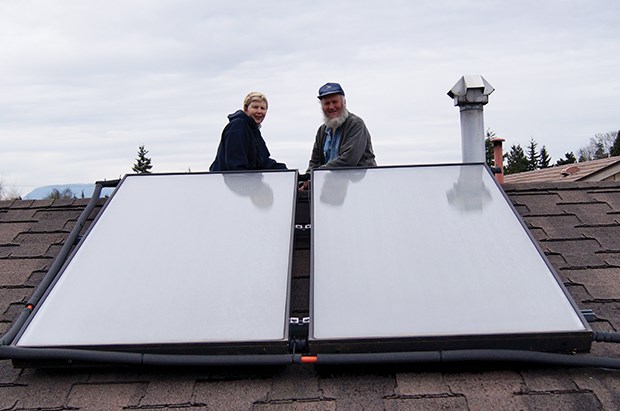In 2007, around the same time Republicans were tar and feathering Al Gore following the documentary An Inconvenient Truth, Deb and Ken Brodie took a flyer on a $5,000 set of solar hot water panels. It was also the same year the Northwest Passage opened, setting a new low in Arctic ice coverage in the industrial age as a result of global warming caused by greenhouse gases.
In seven years, the Brodies say the panels have paid themselves off and their average gas bill is now only $25/month for their 35-year-old, three bedroom split-level home, that features a small hot tub. According to Fortis BC the average monthly bill for BC customers is $78.
The Brodies received a $1,000 rebate at the time of purchase. But now, after helping about 100,000 residents green their homes the LiveSmart BC residential Efficiency Incentive Program will draw to a close on Monday after once offering up to $7,000/household in rebates. This follows the closure of a similar federal program in 2012.
So, are we done making our homes more energy efficient? Was Gore a passing phenomenon? And if the Brodies are a gold star example of the financial and environmental benefits of solar energy being applied to residential homes, why do only a handful of homes in Richmond have solar panels?
Ultimately, these questions may increasingly be left up to municipalities to answer. And if Richmond's past and planned efforts to reduce its carbon emissions are any indication, Richmondites can continue to expect to have opportunities to reduce their environmental footprint - including, possibly, installing solar panels.
According to Peter Russell, Richmond's senior manager of sustainability and district energy, B.C. municipalities had once thought buying carbon credits from the now folded provincial Pacific Carbon Trust would be part of the answer. In 2008, the city set a goal of becoming carbon neutral in 2012. It failed to attain that goal. "I'm sensitive to how that can be viewed. Cities anticipated that a good solution would emerge, but when the only solution was to buy from the province, it didn't seem appealing," because the money was leaving the municipalities, said Russell.
What has emerged is a new carbon neutrality plan from the city that hopes to target communitybased emission-saving initiatives and provide them with funding in exchange for carbon credits. Furthermore, by 2050 the city hopes to have reduced its greenhouse gas emissions by 80 per cent from 2007 levels.
The city is undertaking a number of initiatives, such as how it is presently purchasing fewer, smaller and/or emission-free vehicles for its service fleet.
Russell said city staff are in the preliminary stages of exploring a solar panel carbon offset/rebate for homeowners who install panels.
The credits may only be worth a few hundred dollars annually, but as Russell notes, all of the initiatives the city offers are voluntary, which has led to it being the only BC Hydro PowerSmart certified municipality in BC.
And while the city has mandated all new homes be "solar panel ready" Coun. Harold Steves has raised the possibility of having solar panels becoming mandatory on new homes. "If we just had solar panels on all our homes we wouldn't need to be building more (hydro-electric) dams and flooding the Peace River region," said Steves.
BC Hydro notes there are just 238 homes province-wide that sell back electricity from solar panels. Steves said if a new home is being sold for more than $1 million, adding a $10-20,000 solar panel isn't a stretch of the pockets.
Rob Baxter, co-owner of Vancouver Renewable Energy, a company that installs solar panels, agreed with Steves' premise, but says existing homeowners don't see much short-term benefit for the panels.
"Four and five years ago people had rebate incentives to use solar hot water. What's happened since then is the price of natural gas has come down and incentives have gone away," said Baxter. Photovoltaic panels may not be a good, immediate payoff either as a result of B.C having some of the cheapest electricity in North America.
A photovoltaic system costing $15-20,000 currently saves about $700 a year in electricity, said Baxter. The panels come with a 25-year warranty but last much longer, said Baxter, noting efficiency and costs are improving.
"We're always honest and realistic with people so it's usually people interested in the environment having the panels installed," he added.
Baxter said Richmond's over and above standards compared to provincial building codes is a step in the right direction.
"Solar hot water is a bit more difficult to install. It's easier if the plumbing conduit is pre-built," he said. Steves said the city has an opportunity to be a leader and usher in change, not unlike Lancaster, Cal., the first city in the United States to mandate solar panels on new homes.
The Jan.1, 2014 initiative was spearheaded by Mayor Rex Parris, a Republican.



